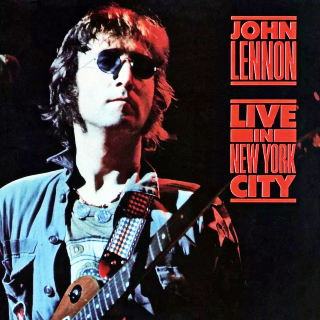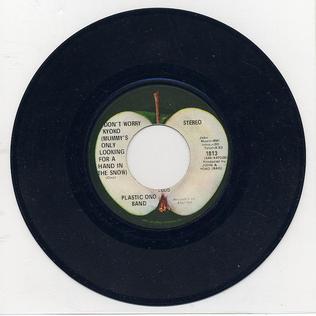
Some Time in New York City is a part-studio, part-live double album by John Lennon and Yoko Ono as Plastic Ono Band that included backing by the American rock band Elephant's Memory. Released in June 1972 in the US and in September 1972 in the UK on Apple Records, it is Lennon's sixth album to be released under his own name, and his fourth with Ono. Like Lennon's previous solo albums, it was co-produced by Lennon, Ono and Phil Spector. The album's agitprop lyrics are politically charged compared to its predecessors, addressing political and social issues and topics such as sexism, incarceration, colonialism, and racism.

Double Fantasy is the fifth studio album by John Lennon and Yoko Ono, and the final one to feature Lennon before his death. Released in November 1980 on Geffen Records, the album marked Lennon's return to recording music full-time, following his five-year hiatus to raise his son Sean. Recording sessions took place at the Hit Factory in New York City between August and October 1980. The final album features songs from both Lennon and Ono, largely alternating between the two in its track listing. Other tracks recorded by Lennon from the sessions were compiled by Ono for release on Milk and Honey in 1984.

Unfinished Music No. 2: Life with the Lions is the second of three experimental albums of avant-garde music by John Lennon and Yoko Ono, released in May 1969 on Zapple, a sub label of Apple. It was a successor to 1968's highly controversial Unfinished Music No. 1: Two Virgins, and was followed by the Wedding Album. The album peaked in the United States at number 174, 50 places lower than the previous album. The album, whose title is a play on words of the BBC Radio show Life with The Lyons, was recorded at Queen Charlotte's Hospital in London and live at Cambridge University, in November 1968 and March 1969, respectively. The Cambridge performance, to which Ono had been invited and to which she brought Lennon, was Lennon and Ono's second as a couple. A few of the album's tracks were previewed by the public, thanks to Aspen magazine. The album was remastered in 1997.

Live in New York City is a posthumous live album by English rock musician John Lennon with the Plastic Ono Elephant's Memory Band. It was prepared under the supervision of his widow, Yoko Ono, and released in 1986 as his second official live album, the first being Live Peace in Toronto 1969.

The Plastic Ono Band were a rock band formed by John Lennon and Yoko Ono in 1969 for their collaborative and solo projects based on their 1968 Fluxus conceptual art project of the same name.

The John Lennon Collection is a 1982 posthumous compilation album of music from John Lennon's solo career.

"Cold Turkey" is a song written by English singer-songwriter John Lennon, released as a single in 1969 by the Plastic Ono Band on Apple Records, catalogue Apples 1001 in the United Kingdom, Apple 1813 in the United States. It is the second solo single issued by Lennon and it peaked at number 30 on the Billboard Hot 100 and number 14 on the UK Singles Chart. The song's first appearance on an album was Live Peace in Toronto 1969 where the song had been performed live on 13 September 1969 with Lennon reading the lyrics off a clip-board.

"Whatever Gets You thru the Night" is a song written by John Lennon, released as a single in 1974 on Apple Records, catalogue number Apple 1874 in the United States and Apple R5998 in the United Kingdom. In the U.S. it peaked at No. 1 on all three record charts: Billboard Hot 100, Cashbox, and Record World, and at No. 36 in the UK. It was the lead single for Lennon's album Walls and Bridges; in the UK the single was released on the same day as the album. "Whatever Gets You thru the Night" was Lennon's only solo No. 1 single in the United States during his lifetime, making him the last member of the Beatles to finally reach the top of the charts. In Canada, the single spent two weeks at No. 2, and became the 30th biggest hit of 1974.

"Power to the People" is a song written by John Lennon, released as a single in 1971, credited to John Lennon/Plastic Ono Band. It was issued on Apple Records and charted at #6 on the British singles chart, at number 10 on the Cashbox Top 100, and at number 11 on the Billboard Hot 100 The song's first appearance on album was the 1975 compilation Shaved Fish.

"Mother" is a song by English musician John Lennon, first released on his 1970 album John Lennon/Plastic Ono Band. An edited version of the song was issued as a single in the United States on Apple Records, on 28 December 1970. The single edit runs 1:41 shorter than the album due to removing the tolling bells that start the song and a quicker fade-out. The B-side features "Why" by Yoko Ono. The song peaked in the United States at number 19 on the Cashbox Top 100 and number 43 on the Billboard Hot 100. In Canada the song reached number 12.

"Woman" is a song written and performed by English singer John Lennon from his 1980 album Double Fantasy. The track was chosen by Lennon to be the second single released from the Double Fantasy album, and it was the first Lennon single issued after his murder on 8 December 1980. The B-side of the single is Ono's song "Beautiful Boys".

"Watching the Wheels" is a single by John Lennon released posthumously in 1981, after his murder. The B-side features Yoko Ono's "Yes, I'm Your Angel." It was the third and final single released from Lennon and Ono's album Double Fantasy, and reached No. 10 in the US on the Billboard Hot 100 and No. 7 on Cashbox's Top 100. It peaked at number 30 in the UK.

"Nobody Told Me" is a song by John Lennon. The B-side features Yoko Ono's "O' Sanity"; both are on the Milk and Honey album. The promo video for the single was made up of clips of footage from Lennon's other videos, as are most posthumous Lennon videos.

"Mrs. Lennon" is Yoko Ono's first single from her second studio album Fly, released in 1971. It was written and performed by Ono, and produced by Ono and her husband John Lennon. It includes the B-side "Midsummer New York". "Mrs. Lennon" was featured in the 1972 film Imagine.

"Sisters, O Sisters", also known as "Sisters O Sisters", is a song written by Yoko Ono that first appeared on John Lennon's and Yoko Ono's 1972 Plastic Ono Band album Some Time in New York City, backed by Elephant's Memory. It was also released as the b-side to the couple's "Woman Is the Nigger of the World" single. It has been covered by a number of artists, including Le Tigre and Tater Totz.
"We're All Water" is a song written by Yoko Ono that was first released on the 1972 John Lennon and Yoko Ono Plastic Ono Band album Some Time in New York City. It was the last song on the first record of the album, and the last song on the album that was recorded in the studio.

"Don't Worry Kyoko (Mummy's Only Looking for A Hand in the Snow)" is a song by Yoko Ono that was originally released by Plastic Ono Band in October 1969 as the B-side of the "Cold Turkey" single, and was later released on Ono's 1971 album Fly. Several live versions have been released, including on Plastic Ono Band's Live Peace in Toronto 1969 and the John & Yoko/Plastic Ono Band With Elephant's Memory album Some Time in New York City in 1972. An early version was titled "Mum's Only Looking for Her Hand in the Snow". It has been covered by several other artists.

"Now or Never" is a song written by Yoko Ono that was first released on her 1973 album Approximately Infinite Universe. It was also the lead single off the album, backed by "Move on Fast." A remixed version of "Move on Fast" was later released as a single and reached #1 on the Billboard Dance Club Songs chart.

















